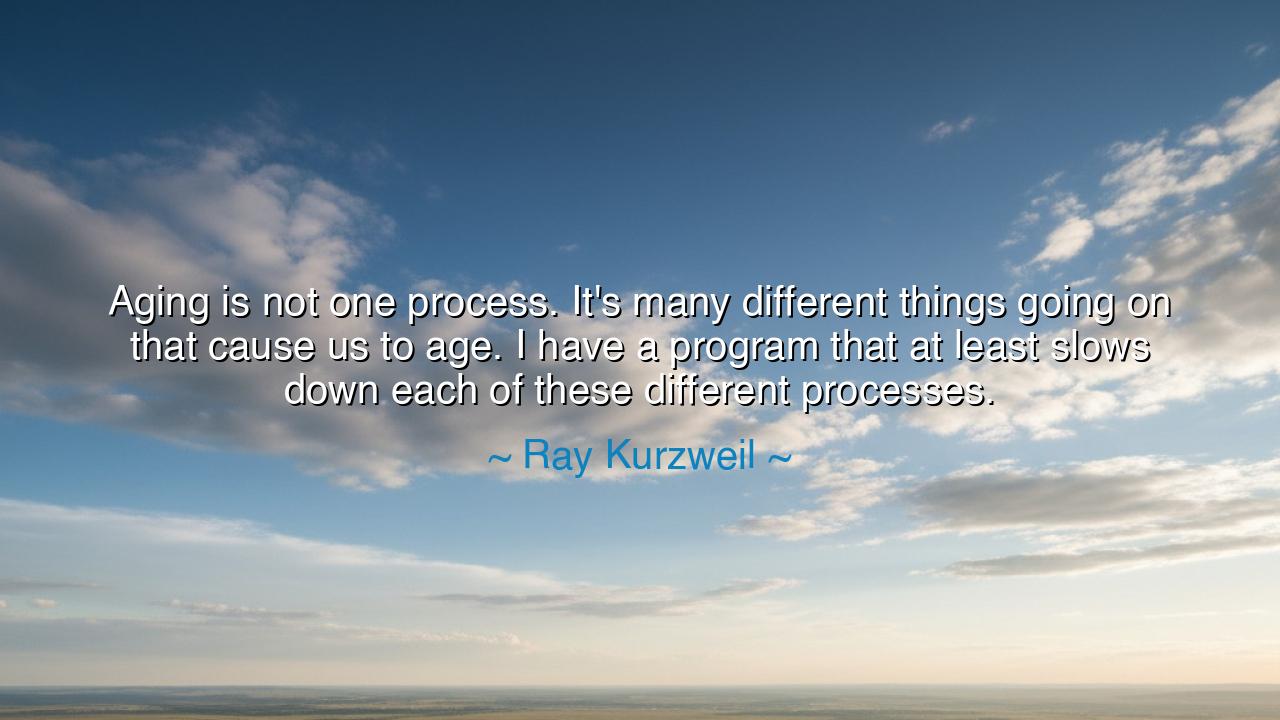
Aging is not one process. It's many different things going on
Aging is not one process. It's many different things going on that cause us to age. I have a program that at least slows down each of these different processes.






"Aging is not one process. It's many different things going on that cause us to age. I have a program that at least slows down each of these different processes." — thus spoke Ray Kurzweil, the visionary of the modern age, a man who peers into the heart of time and seeks to challenge even mortality itself. His words are both scientific and spiritual in their depth, for behind the language of biology lies an ancient human longing — the yearning to understand life, to resist its decay, and perhaps to approach immortality through knowledge. In this reflection, Kurzweil is not merely describing the science of aging; he is confronting the grand mystery of existence, asking whether the march of time is truly inevitable, or whether wisdom and will may yet delay its touch.
In the style of the ancients, one might say: time is the sea in which all things are carried toward silence, yet the wise learn to sail rather than sink. Kurzweil’s insight is that aging is not a single curse, but a constellation of changes — the fraying of cells, the dulling of energy, the slow erosion of memory and form. Each process, he tells us, is a battle in itself. And though none may escape time’s ultimate dominion, each may fight upon the field where it stands. His “program,” whether of technology, nutrition, or disciplined mind, is the modern philosopher’s stone — an attempt to transmute decline into endurance. Yet beneath his scientific precision lies an eternal truth: that to care for the body and mind is an act of reverence for life itself.
Ray Kurzweil, born of an age of machines, stands as one of those rare men who bridge flesh and circuit, nature and invention. He looks upon aging not as destiny but as design — a system to be understood, analyzed, and, perhaps, altered. In this, he carries forward the dream of alchemists and mystics who, across centuries, sought to prolong the spark of existence. But where they sought their answers in elixirs and charms, Kurzweil seeks his in data and science. Yet the motive is the same: to preserve the light, to stretch the brief candle of life a little further into the darkness. And though his tools are modern, his quest is as old as mankind’s first gaze upon the setting sun.
To understand his vision, consider the legend of Tithonus, the mortal loved by the goddess Eos, who begged Zeus to grant her beloved eternal life. The wish was granted, but she forgot to ask for eternal youth. So Tithonus lived on, his body withering and crumbling while his heart beat endlessly in torment. This ancient myth carries the same warning that humbles the ambitions of every age: that longevity without renewal is suffering, and that the true goal is not mere length of days, but vitality, balance, and purpose. Kurzweil’s philosophy, then, can be seen as the modern answer to that myth — not to live forever as a shadow, but to live wisely, vibrantly, to slow the decline while the mind still shines.
Aging, he reminds us, is not an enemy to be hated, but a teacher to be understood. To study its many processes is to learn humility — to see that life is not undone by one cause, but by many small frictions, each of which can be soothed by care, knowledge, and discipline. The body thrives on balance, the mind on curiosity, the spirit on purpose. In learning how to tend each of these realms, we become stewards of our own vitality. Thus, Kurzweil’s “program” is not merely about technology; it is a call to conscious living — to honor the vessel of life through wisdom and attention, rather than drift toward decay through neglect.
The lesson, then, is as ancient as it is modern: do not surrender passively to the passage of years. Though time moves ever forward, you are not its helpless passenger. You may not halt its flow, but you may learn to navigate its currents with grace. Feed your body as you would feed a flame — with discipline, moderation, and reverence. Sharpen your mind, for thought is the last fortress against decline. And nurture your spirit, for without purpose, even the longest life is but an empty echo. To “slow each process,” as Kurzweil says, is to recognize that immortality begins not in defiance of death, but in the awareness of life.
And so, my child, hear the wisdom hidden beneath the science: to live long is not the same as to live well, but the two are kin. Seek not only the length of days, but their depth. Each breath taken in gratitude is a victory over time; each act of kindness, a renewal of youth. Ray Kurzweil’s words remind us that the battle against aging is not fought only in laboratories or diets, but in the heart — in the choice to live consciously, to care for oneself and others, to pursue knowledge, and to rejoice in existence. For while no one may stop the turning of the years, the one who walks in awareness does not merely endure time — he transcends it.






AAdministratorAdministrator
Welcome, honored guests. Please leave a comment, we will respond soon